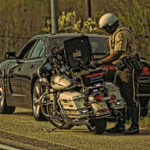 Recently in an interview, Actor/Comedian/Talk Show Host Steve Harvey related what he tells his three kids about what to do when being stopped by police. Obviously, with the present problem of police shootings that seems to develop from what may have otherwise been routine traffic stops, it should be everyone’s concern to maximize their safety, and minimize the risk of a police “over-reaction.”
Recently in an interview, Actor/Comedian/Talk Show Host Steve Harvey related what he tells his three kids about what to do when being stopped by police. Obviously, with the present problem of police shootings that seems to develop from what may have otherwise been routine traffic stops, it should be everyone’s concern to maximize their safety, and minimize the risk of a police “over-reaction.”
Whether you are Black, White, or any other color in the spectrum, if you are not in a marked squad car, or other police vehicle, with proper law enforcement credentials, then to every officer out there, you are a potential “perpetrator”. Since an officer does not, in all likelihood, know you or your background when stopping you for a traffic violation, his or her concern for his or her own safety is the most important concern to that officer.
So what should one do when being stopped by the police for an alleged traffic violation? Mr. Harvey had the right idea. He said to do everything possible to convey your non-threatening status to the officer, and under no circumstances should you engage the officer in any argument or debate about the basis of the stop or the officer’s directions.
First of all, the officer does not know what kind of threat he or she may be facing while approaching your vehicle, so it is an excellent idea to immediately have your driver’s license and proof of insurance in your hand, with your wrists on top of your steering wheel, and hold that position until the officer gets to your window, and sees that your hands hold no weapons. This should relax the officer a little bit. Having your papers ready will also earn you bonus points with the officer, because you have them available without being asked, and more importantly, without having to move your hands into areas where he cannot see, causing the potential fear that you may reach for a weapon that may be present.
After you give the license and insurance to the officer, remain seated in the car unless the officer directs you to exit. When you do exit, make sure you keep those hands where they can be seen, and narrate your steps: “OK, I am going to open the door”, “I am stepping out now.” If the officer engages you in discussion, remember that you have the right to remain silent, and not answer questions about where you are going, where you came from, or what you may otherwise be doing.
If the officer asks you if you know why you were stopped, there are two schools of thought: one school says “if you actually know you violated an ordinance like speeding, failure to stop at the sign, improper turn, or some other minor infraction, just admit to it, and you may get a pass”. The other school of thought says: “assert your right to not answer questions (politely) as provided by the 5th Amendment to the U.S. Constitution.” Either way, the goal is to not incite the officer to use violence, but to encourage the officer to finish his purpose of stopping you as quickly as possible and get home in one piece.
If the officer orders you out of the vehicle, comply immediately. If the officer moves to arrest you, comply. You have absolutely no right to defend yourself from an arrest, even if it is unlawful. Remember, if the officer ORDERS you to do something, comply immediately. If the officer ASKS you to do something, you may choose not to do so, but be polite in your refusal. The difference is that complying with a request is viewed as giving “consent”, whereas complying with an order can result in a finding that you have been “seized” in a way that may allow protection under the Fourth Amendment’s prohibition of unreasonable search and seizure of your person or effects.
Even if you wind up being arrested, as long as you comply with orders, you should be taken into custody without being harmed, and can fight the charges in a court of law. If you are arrested for any offense, you should have an experienced lawyer defend you. Call the Chicago police brutality lawyers at Mitchell S. Sexner & Associates LLC. at (312) 644-0444, for a free initial consultation. If it is important to you, it is important to us.

